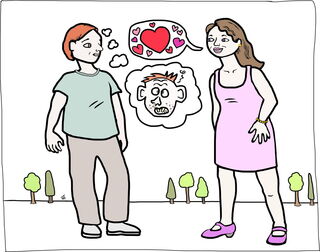Self-Esteem
The Secret Language of People with Low Self-Esteem
... and how they interpret what others say to them.
Updated December 8, 2023 Reviewed by Chloe Williams
Key points
- Because self-hatred can infuse interpersonal interactions with perceived double meanings.
- Used to a fierce inner critic, people with low self-esteem "hear" harsh words in neutral or friendly talk.
- Many people who are the most fluent in the language of low self-esteem don't even realize that it exists.
Low self-esteem has its own language.
What I — as a nearly-lifelong speaker — call Lowselfesteemish comprises not just the real words that people with low self-esteem say: for instance, "I'm hideous." It also comprises words we don't say but think and mean while saying other ones.
For instance, "Hi, I'm Taylor" means, in Lowselfesteemish, "I'm Taylor and must now apologize for being in your presence. Please don't punch me in the face."
Lowselfesteemish also auto-translates, in the minds of fluent speakers, words that others say and might consider positive or neutral into insults, taunts and threats.
For instance, "You look nice today" auto-translates in Lowselfesteemish into "You look even worse than usual today," while "Great job!" auto-translates into "I'm about to fire you."
Studies reveal that self-hatred impairs our ability to trust others — which is hardly surprising, given that it makes us unable to trust ourselves.
This Lowselfesteemish glossary examines grammar and vocabulary that you might find foreign, familiar — or both. One facet of Lowselfesteemish is that many of its fluent speakers speak it without knowing it exists. It is a secret language even to those who use it the most.
Here are some examples of what Lowselfesteemish speakers say, followed immediately by what, to those same Lowselfesteemish speakers, those words mean.
What we say:
"No, thank you."
What we mean:
"Whatever you're offering, I don't deserve it."
. . .
What we say:
"Excuse me."
What we mean:
"Ignore, humiliate, or punish me."
. . .
What we say:
"I'm ready."
What we mean:
"I'm not ready, I'm never ready, please don't make me do/say/be something for which I might be watched and judged by others, dear Lord lock the door."
. . .
What we say:
"Would you like to have dinner with me?"
What we mean:
"I'm requesting your companionship while speaking in a resignedly slow cadence that grants you the time to devise at least three plausible-sounding excuses for refusing my request."
. . .
What we say:
"Doctor, my ankle hurts. Is it sprained?"
What we mean:
"Doctor, I screwed up my damn ankle by being an uncoordinated idiot who wears stupid shoes and can't even walk like a normal person down the freaking street."
. . .
What we say:
"This is my friend Ben."
What we mean:
"This is Ben, one of maybe four people on earth who are ignorant/saintly/stupid enough to inexplicably tolerate my presence for more than three minutes straight."
. . .
What we say:
"I love you," or "Can we talk?" or "May I have a raise?"
What we mean (in all three cases):
"I'll just see myself out."

And here are some examples of what other people say to Lowselfesteemish speakers, followed immediately by what Lowselfesteemish speakers hear.
What others say:
"Hi, can I help you?"
What we hear:
"Hi, can you please leave?"
. . .
What others say:
"Wow, you won!"
What we hear:
"Wow, you cheated!"
. . .
What others say:
"Nice to have met you."
What we hear:
"There's ten precious minutes of my life that I'm never getting back."
. . .
What others say:
"Those are beautiful shoes."
What we hear:
"Those are terrible shoes and I'm secretly mocking your sad grateful smile."
Maybe this glossary can help us conjugate our own and others' Lowselfesteemish. Maybe it can help us back-translate some of what we hear and say into less horrific, hellish, harmful terms.
Facebook image: Magomed Magomedagaev/Shutterstock


